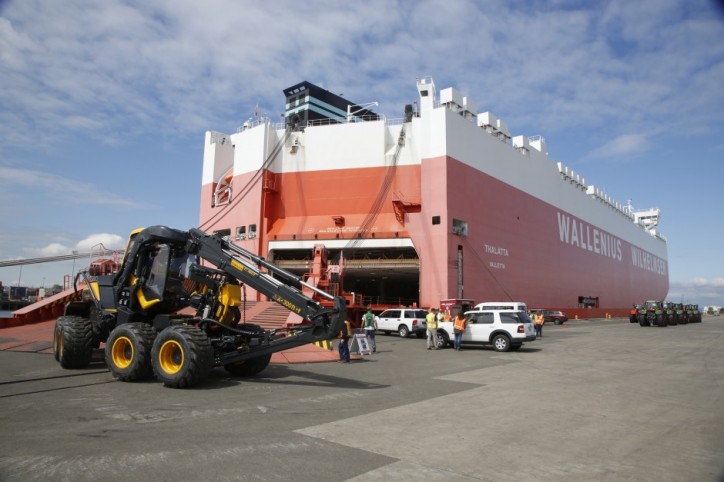Tuesday’s visit by Wallenius Wilhelmsen Logistics’ Post-Panamax Thalatta demonstrates new cargo opportunities and environmental benefits for the Puget Sound gateway
A new high efficiency vessel designed specifically to take advantage of the widened Panama Canal and reduce its carbon footprint arrived Tuesday at The Northwest Seaport Alliance’s East Blair One terminal in Tacoma.
The first-call visit by the Wallenius Wilhelmsen Logistics (WWL) MV Thalatta indicates the larger locks in Panama open new opportunities for both roll-on/roll-off (Ro/Ro) and container cargoes moving through the Pacific Northwest. The new locks opened in June and allow transit of much larger vessels.
Vehicles carrier Thalatta - Image courtesy: NW Seaport Alliance
“The wider Panama Canal provides our gateway with expanded capacity to global markets, particularly in Europe, the Mediterranean and South America,” said Bari Bookout, the NWSA’s chief commercial officer for non-container. “The new locks allow carriers like Wallenius Wilhelmsen Logistics to develop larger, more efficient vessels to meet customer demand and regulatory requirements.”
The Thalatta is the second in WWL’s High Efficiency Ro/Ro (HERO) fleet, designed to increase capacity and cargo flexibility while reducing emissions. Its sister ship, the MV Themis, is expected to visit the NWSA this fall.
At 650 feet long (200 meters) and 120 feet wide (36.5 meters), the Thalatta has capacity to transport up to 8,000 vehicles. The vessel features five liftable decks to allow for multiple configurations and a wide variety of cargoes. A shallower draft gives these ships access to a wider range of ports globally.
WWL has environmental ambitions for a zero emissions future, and the Thalatta includes several innovations to reduce fuel consumption and its environmental impact. Most notable is the new Exhaust Gas Cleaning System that ensures sulphur emissions comply with the Emissions Control Area (ECA) regulations. The system also reduces particulate emissions by 70 percent, and significantly reduces Sox, CO2 and NOx emissions.
Additionally, the vessel is significantly wider that other Ro/Ro vessels, so it requires less ballast water to maintain vessel stability. That improves vessel efficiency and reduces the environmental risk of invasive species.
WWL expects to deploy a total of eight HERO vessels before the end of 2017.
The East Blair One terminal located in The Northwest Seaport Alliance’s South Harbor is dedicated to breakbulk and Ro/Ro cargoes.
Built in 2008, the 20-acre (8.1-hectacre) terminal offers a 1,200-foot (366-meter) deep-water berth and heavy-lift pad rated at 2,000 PSF, as well as on-dock rail and excellent highway connections.
The terminal is operated by the NWSA.
The Northwest Seaport Alliance is a marine cargo operating partnership of the ports of Seattle and Tacoma. Combined, the ports are the fourth-largest container gateway in North America. Regional marine cargo facilities also are a major center for bulk, break-bulk, project/heavy-lift cargoes, automobiles and trucks.
Source: NW Seaport Alliance

